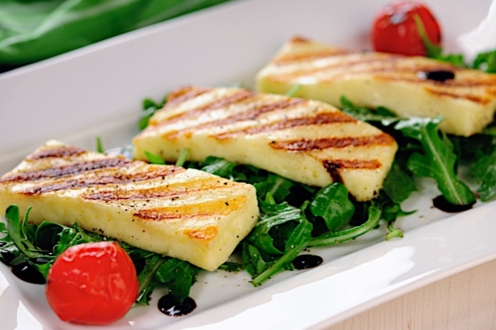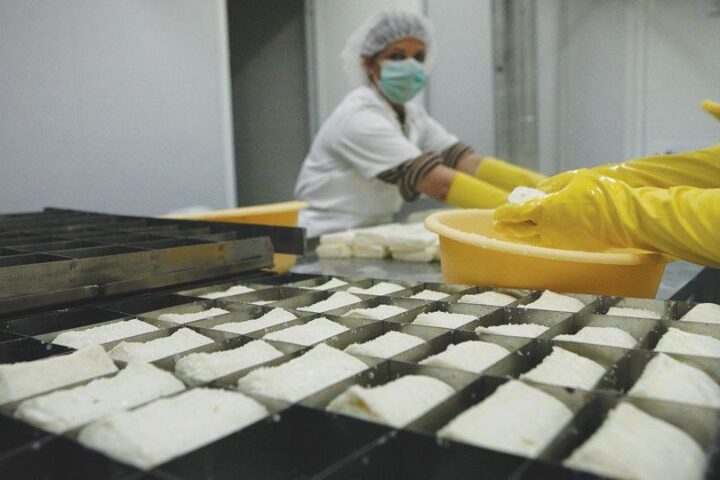Cyprus’ famous cheese is no longer shielded by trademarks, whether in the EU or elsewhere, after losing another legal battle in the Halloumi trade wars, this time to Bulgarian rival BBQloumi.
On Wednesday, an EU court ruled that there is no possibility of consumers confusing Cyprus’ traditional cheese Halloumi with Bulgarian imitator BBQloumi, essentially dismissing the government’s challenge.
The European Court of Justice General Court ruled there is “no likelihood of confusion between the collective mark HALLOUMI and the sign ‘BBQLOUMI’ which serves to designate the products of a Bulgarian company”.
The “Foundation for the Protection of the Traditional Cheese of Cyprus named Halloumi” owns an EU collective trademark for the Cypriot white cheese.
It took the case to court, helped by the Cyprus legal services, over EU trademark infringements by the Bulgarian company but it lost the latest legal battle.
The blunder follows other cases where the Halloumi trademark was not enough to protect Cyprus white cheese.
It lost the UK trademark a couple of years back, although Cyprus legal services convinced UK courts to reinstate it.
A food industry observer with experience in legal proceedings over halloumi feels the cheese is cornered with record exports put at risk.
“The collective wordmark ‘Halloumi’ was registered on 14 July 2000 and remains across the EU and UK. It is supposed to protect the product against any imitators in the union,” said the source.
Cyprus’ flagship halloumi export had its best year in 2020 despite demand crumbling at the end of the year with lockdowns imposed across Europe to combat the second wave of coronavirus crippling the hospitality sector.
Last year ended with halloumi generating a whopping €260 mln from exports of 40,000 tonnes, yielding €115 mln from 17,000 tonnes sold to UK importers.
“This is all at stake. Trademarks can no longer protect Halloumi. As our exports grow, and the profit pie gets bigger and bigger, the more this will attract imitators who will want to take a chunk of it for themselves,” said the source.
“Cyprus losing the BBQloumi case will set a precedent for dairy producers putting forward their version of halloumi dubbing it ‘white’, ‘barbeque’ or ‘grill’, cheese.
“Don’t be surprised to find cheeses in the market dubbed grilloumi, or anything ending in loumi.”
The source said the EU court decision was baffling.
Hard cheese
Cyprus lost a similar case in the UK when Cyprus legal services failed to fend off a Hungarian Cheese product registered under Hadju Halloumi.
“A UK hearing in March ruled in favour of the Hungarians, it found that halloumi did not have a reputation among a significant proportion of the general public and there was no chance of confusion between the brands.
“The only way out of this mess is to have halloumi registered with the European Union as a Product of Designated Origin (PDO).
“Cyprus’ PDO submitted in 2015 gives a clear guideline on how Halloumi should be made and its ingredients.
“Cyprus’ traditional squeaky cheese is being grilled in courtrooms across the world while the battle over what constitutes halloumi is still brewing at home.”
According to its EU PDO file, producers must increase the ratio of goat and sheep milk in the squeaky cheese to 25%-75% respectively from 2021.
The government wants to increase the ratio before 2024 when producers must follow the PDO guidelines, using at least 51% of sheep’s and goats’ milk, according to the traditional recipe.
Goats’ milk in the mix can only come from a breed, native to the island.
After negative reactions from cattle breeders and dairy producers, the government-backed down, agreeing to keep the ratio of goat and sheep milk to cow milk at 20-80%.
Dairy producers feel that Halloumi is in danger from the “self-destructive” strategy of state lawyers.
Talking to the Financial Mirror, Cyprus Dairy Producers Association president George Petrou argued they have grown accustomed to hearing about cases lost in courtrooms across Europe.
Dairy makers abroad are penetrating markets controlled by Cypriot producers with their version of halloumi, encouraged by the loss of the UK trademark, said Petrou.
“Some dairy producers have started selling their halloumi-type products. In the case of Bulgaria, the battle was not lost, as there was no battle.
“We simply appealed as the Republic of Cyprus at the highest level, their supreme court rejected our appeal,” Petrou told the Financial Mirror.
“Our advisors have concluded that the fault lies with the legal services. In recent cases they have not made use of the clause included in the trademark description, that halloumi should be made using Cypriot milk.”
He argued that the legal services are focusing on the ratio of cow’s to sheep milk, included in the Product of Designated Origin (PDO) file submitted to the European Commission.
Asked to comment on the lost legal battle against BBQloumi, the Commerce Ministry said that Halloumi is under legal attack.
“The court case was just one of 80 cases involving dairy producers around the world trying to register their version of halloumi by employing several tricks,” said Panayiota Patsali, head of the Ministry’s Commerce Department.
She said the Ministry decided to fight the case, “as we felt it could endanger the future of the Cypriot cheese in the UK as halloumi products could be pushed off the shelf by other similar cheeses using the word ‘halloumi’ somewhere in their label”.
“However, there is no reason for panic. We do not think that the EU court decision was damaging for us and our national cheese, as the grounds given for the decision, was that there is no possibility of consumers confusing Cyprus’ traditional cheese Halloumi with its Bulgarian imitator BBQLOUMI in a legal fight to protect the brand.”
Patsali said it is essential that stakeholders on the ground in Cyprus do not fall in the trap of blowing things out of proportion as losing one battle is not the end of the world.
“This is to be expected. You lose some, you win some.”










